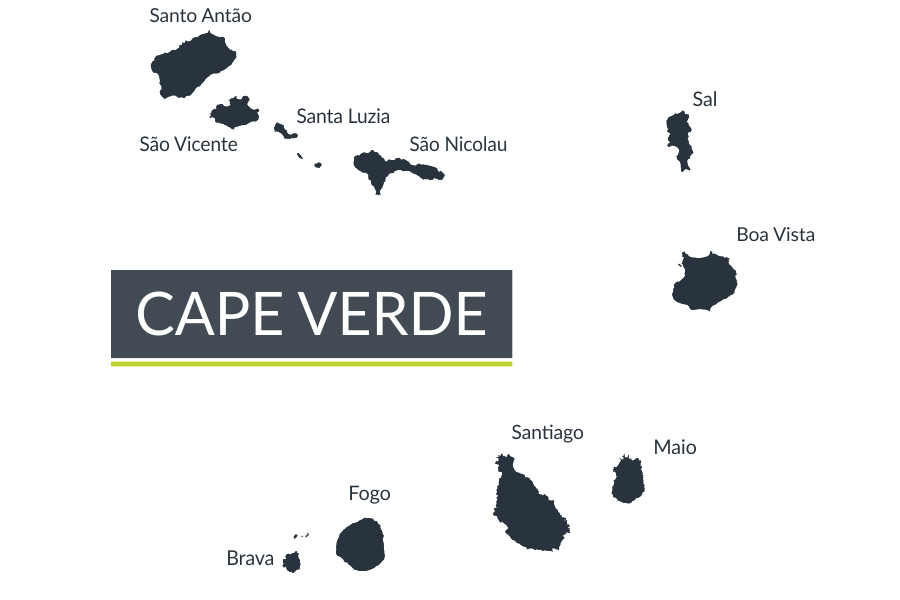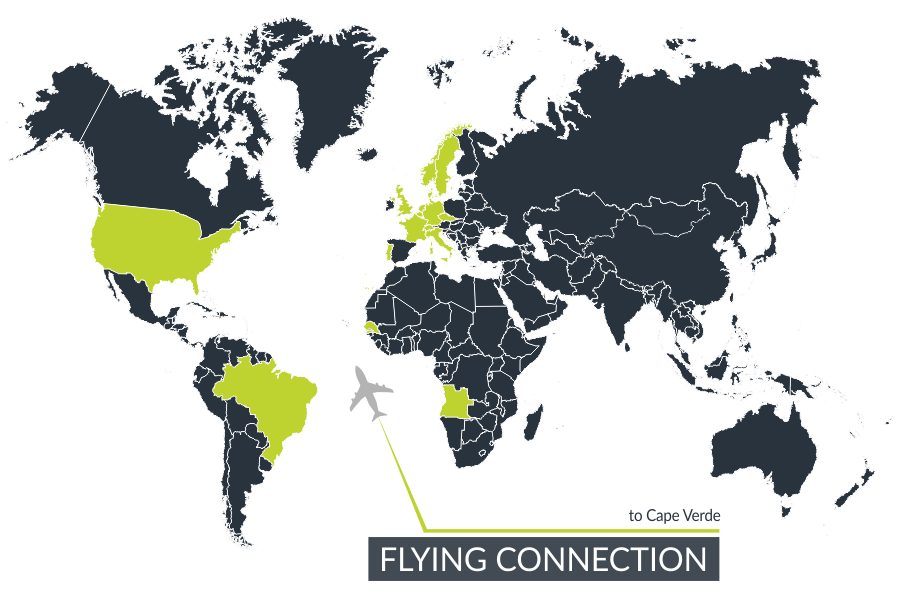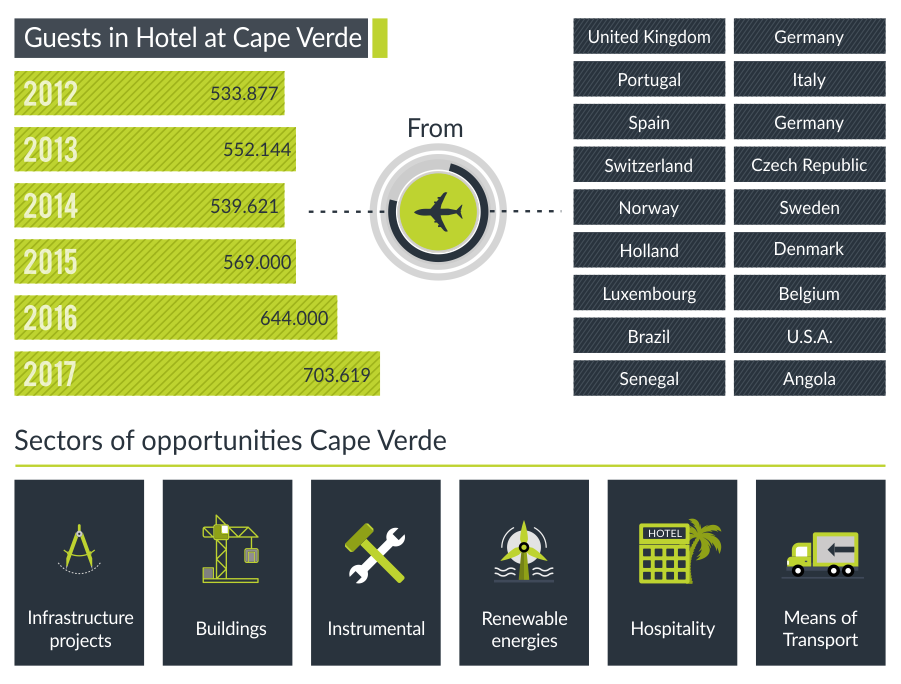CAPE VERDE INVESTMENT
The incentives for investing in Cape Verde :
- Tax Incentives: The government offers tax breaks and reductions to encourage investment. This may include tax holidays, reduced corporate tax rates, and exemptions on certain types of income.
- Customs Duty Exemptions: Investors may benefit from exemptions or reductions on customs duties for importing equipment, machinery, and raw materials necessary for their projects, reducing initial setup costs.
- Investment Guarantees: The government provides guarantees to protect investors against risks like expropriation, non-commercial risks, and transfer restrictions, boosting investor confidence.
- Access to Land and Infrastructure: Preferential access to land and infrastructure facilities can be provided, either at subsidized rates or through government support programs, facilitating investment activities.
- Streamlined Business Registration: Measures are in place to simplify business registration processes, reducing bureaucratic hurdles for investors. One-stop shops or online platforms facilitate company registration, permits, and licenses.
- Investment Promotion Agencies: Cape Verde has investment promotion agencies offering support throughout the investment process, providing information, facilitation services, and guidance on investment opportunities and regulations.
-
- Sector-Specific Incentives: Special incentives target priority sectors such as tourism, renewable energy, agriculture, fisheries, and information technology. These may include grants, subsidies, or preferential treatment for investments in these areas.
These incentives collectively aim to foster a conducive investment climate, drive economic growth, and attract foreign capital to Cape Verde. However, investors should carefully review eligibility criteria, terms, and conditions associated with these incentives before to makin an investment decisions
Cape Verde, officially the Republic of Cape Verde, is an island country located in an archipelago formed by ten volcanic islands in the central region of the Atlantic Ocean. About 570 kilometers off the coast of West Africa, the islands cover a total area of just over 4,000 square kilometers.
The archipelago was occupied and, as the colony grew in importance among the main shipping routes between Europe, India and Australia, the population increased steadily. At the time of their independence from Portugal in 1975, Cape Verdeans emigrated to the whole world, so that the population in the twentieth century with more than half a million people on the islands is matched by the Cape Verdean diaspora in Europe, America and Africa.
The Cape Verdean economy is mainly focused on growing tourism and foreign investments, which benefit from the hot climate all year round, the diverse landscape and cultural richness, especially in music. Historically, the name “Cape Verde” has been used to refer to the archipelago and, since independence in 1975, to the country.
The volcanic islands that comprise it are small and mountainous. There is an active volcano on the island of Fogo, which is also the highest point of the archipelago, with 2829 m. The country consists of 10 islands, of which 9 inhabited, and several uninhabited islets, divided into two groups:
• To the north, the islands of Barlavento. Relating from west to east: Santo Antão, São Vicente, Santa Luzia (uninhabited), São Nicolau, Sal and Boa Vista. The Barlavento group also includes the uninhabited islets of Branco and Raso, located between Santa Luzia and São Nicolau, the Isles of the Birds, in front of the city of Mindelo, on the island of São Vicente and the islanders of Rabo de Junco, on the coast of the island of Sal and the islanders of Sal Rei and the Baluarte, on the coast of the island of Boa Vista;
• To the south, the islands of Leeward. Enumerating from east to west: May, Santiago, Fogo and Brava. The islet of Santa Maria, in front of the city of Praia, on the Island of Santiago; the islands Grande, Rombo, Baixo, de Cima, the King, Luís Carneiro and the Isidro Sapado, located about 8 km from the island Brava and the islet of Sand, near the coast of the same island.
The largest islands are Santiago to the southeast, where Praia is located, the capital of the country, and the island of Santo Antão, in the extreme northwest. Praia is also the main population cluster of the archipelago, followed by Mindelo, on the island of São Vicente.
The population of Cape Verde is one of the healthiest in Africa. Since independence, the country has greatly improved its health indicators. In addition to being promoted to the “medium development” group of countries in 2007, leaving the less developed countries category Cape Verde is currently the ninth best African country in the Human Development Index.
POLITICAL. Cape Verde is a politically stable country. The government is oriented towards consensus and respect for the majority. And it defends a strong investment in the economy of private companies and favours public-private partnerships concentrating economic growth between tourism, services and the sea economy. The authorities are promoting stability, guarantees, legal security and predictability for economic in Cape Verde.
MACROECONOMIC DATA
• Percentage of tourism in GDP: 20% (this sector generated about 36 thousand jobs)
• GDP growth (annual): 2011-4%, 2012-1%, 2013-1%, 2014-2.7%. 2015-1%, 2016-4%
• Projected GDP growth 2018: 4.5%
• Agreement with the EU.
Cape Verde is a country of the ACP group with which the EU has a free trade agreement and access to European markets.
Tourism in Cape Verde has increased by 11.2% compared to the same period of 2016, Boa Vista is the spearhead of this development. These data, combined with ongoing development prospects and tourism projects (an increase of 3,000 rooms in Boa Vista over the next 4 years) represent a great business opportunity for investors and companies seeking emerging markets.


Why invest in Cape Verde
- 60 direct fly from the main european capital with a fly duration of only 5.30 h (not jet bag )
- Climate all year round from 25º and 30º
- Beach of fine White sand and crystal clear sea
- Most stable and democratic country in Africa
- Invest in a booming economy with annual growth of 4,5%
- Annual tourism growth of 15%
- Laws guaranteeing full ownership of properties
Friendy - 1 for foreign direct investment friendly
- Tax benefits and exemptions of customs taxes
- Hight rental income on properties purchased


The property buyers from 80.000€ in Cape Verde and from 120.000€ (in Boa Vista and Sal) can request the residence document in Cape Verde.
There are no restrictions to buy a property in Cape Verde for foreigners.
The exchange has fixed rate is 1 € = 110.265 ECV






